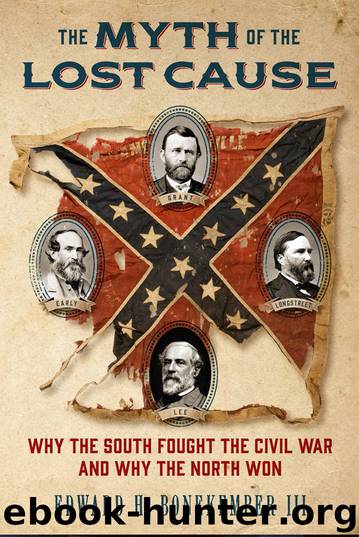The Myth of the Lost Cause by Edward H. Bonekemper III

Author:Edward H. Bonekemper, III
Language: eng
Format: epub
ISBN: 9781621574736
Publisher: Regnery Publishing
Published: 2015-09-28T16:00:00+00:00
CHAPTER SEVEN
DID ULYSSES S. GRANT WIN THE CIVIL WAR SIMPLY BY BRUTE FORCE AND SUPERIOR NUMBERS?
THE MYTH
If rebel soldiers were invincible and their General Lee above reproach, reasons for the Confederacy’s defeat had to be found elsewhere. How could Lee have lost to Ulysses S. Grant, of all people—a drunk and a butcher, according to the Myth, with barely any military talent? The answer must be the North’s superior resources and its willingness to employ them with the necessary brutality.
In 1866, E. A. Pollard provided a classic version of the Myth’s portrait of Grant:
The new Federal commander in Virginia [Grant] was one of the most remarkable accidents of the war. That a man without any marked ability, certainly without genius, without fortune, without influence, should attain the position of leader of all the Federal armies, and stand the most conspicuous person on that side of the war, is a phenomenon which would be inexplicable among any other people than the sensational and coarse mobs of admiration in the North. Gen. Grant’s name was coupled with success; and this circumstance alone, without regard to merit of personal agency, without reference to any display of mental quality in the event, was sufficient to fix him in the admiration of the Northern public. It mattered not that Grant had illustrated no genius; it mattered not that he had smothered Fort Donelson by numbers; it mattered not that he had succeeded at Vicksburg through the glaring incompetency of a Confederate commander, and by the weight of eighty thousand men against twenty odd thousand; the North was prepared to worship him, without distinguishing between accident and achievement, and to entitle him the hero of the war.1
Pollard’s inaccuracies, bias, overstatements, and strange criteria for success speak for themselves, but he did set the tone for a century of criticism of Grant.
Grant has been regarded as a “hammerer and a butcher who was often drunk, an unimaginative and ungifted clod who eventually triumphed because he had such overwhelming superiority in numbers that he could hardly avoid winning.”2 Grant “remains a clumsy butcher to many Americans, who look to a warped historical record that draws heavily on the efforts of Lost Cause writers.”3 He acquired the unfortunate and unfair label of “butcher” because of the high number of Union casualties associated with some of the campaigns and battles that won the American Civil War. He stands accused of unnecessarily slaughtering his own men in order to achieve victory.
Why has Grant so often been labeled a butcher? The accusations began during the war—particularly during his aggressive 1864 campaign against Lee to secure final victory for the Union. During that Overland Campaign, Mary Todd Lincoln complained, “[Grant] is a butcher and is not fit to be at the head of an army.” On June 4, 1864, the Union’s secretary of the navy, Gideon Welles, wrote in his diary, “Still there is heavy loss, but we are becoming accustomed to the sacrifice. Grant has not great regard for human life.” One
Download
This site does not store any files on its server. We only index and link to content provided by other sites. Please contact the content providers to delete copyright contents if any and email us, we'll remove relevant links or contents immediately.
| Africa | Americas |
| Arctic & Antarctica | Asia |
| Australia & Oceania | Europe |
| Middle East | Russia |
| United States | World |
| Ancient Civilizations | Military |
| Historical Study & Educational Resources |
1861 by Adam Goodheart(1041)
Smithsonian Civil War by Smithsonian Institution(1003)
Abraham Lincoln: A Life, Volume 2 by Michael Burlingame(956)
The Fiery Trial by Eric Foner(933)
Ulysses S. Grant by Michael Korda(924)
Rock of Chickamauga(918)
Battle Cry of Freedom by James M. McPherson(918)
Rebel Yell: The Violence, Passion, and Redemption of Stonewall Jackson by S. C. Gwynne(903)
101 Things You Didn't Know About Lincoln by Brian Thornton(903)
Abraham Lincoln in the Kitchen by Rae Katherine Eighmey(851)
This Republic of Suffering: Death and the American Civil War by Drew Gilpin Faust(832)
Bloody Engagements by John R. Kelso(813)
Union by Colin Woodard(792)
Lincoln's Lieutenants by Stephen W. Sears(790)
Leaves of Grass by Walt Whitman(787)
The escape and suicide of John Wilkes Booth : or, The first true account of Lincoln's assassination, containing a complete confession by Booth(760)
1861: The Civil War Awakening by Adam Goodheart(743)
Rise to Greatness by David Von Drehle(718)
The Fiery Trial: Abraham Lincoln and American Slavery by Eric Foner(718)
